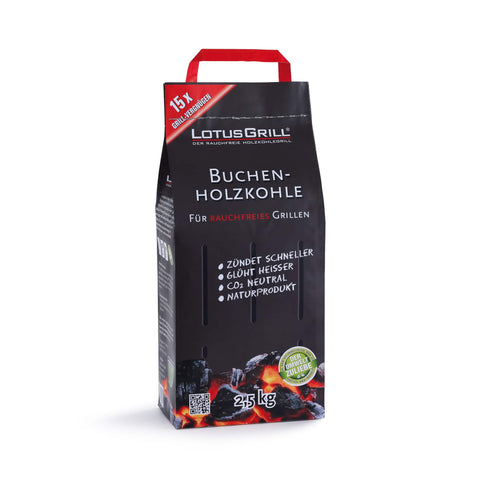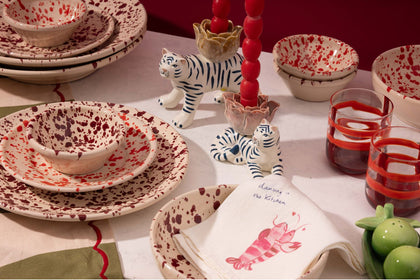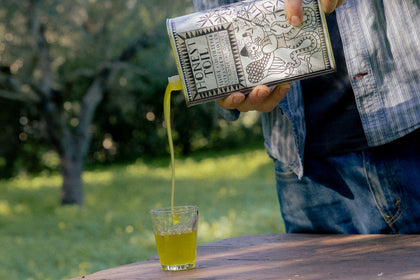Buyer's Guide to Charcoal: Which Type Should I Buy?
by Holly Thomson

While the choice of meat, marinades, and sauces are essential components of a BBQ, one often overlooked factor can make a significant difference in flavour and cooking experience: the type of charcoal you use.
To help you navigate the world of charcoal, we've compiled a comprehensive guide to finding the perfect charcoal for your summer BBQ.
Contents:
What's the difference between charcoals?
Charcoal comes in various forms, each with its own distinct characteristics. Here are some key types you'll encounter:
- Binchotan Charcoal: Originating from Japan, binchotan charcoal is renowned for its high-quality and clean-burning properties. It is made from oak or other hardwoods and undergoes an extended carbonization process. Binchotan produces intense heat, minimal smoke, and imparts a subtle smoky flavor, making it perfect for grilling delicate foods.
- Lump Charcoal: Made from natural hardwood, lump charcoal is prized for its pure, smoky flavor. It burns hot and fast, making it ideal for grilling. Lump charcoal leaves minimal ash, allowing for easy cleanup.
- Coconut Shell Charcoal: Derived from coconut husks, this sustainable option is growing in popularity. Coconut shell charcoal burns clean, with little smoke and ash. It offers a mild flavor profile and can maintain consistent heat for an extended period, making it suitable for long grilling sessions.
READ MORE: Getting started with your BBQ charcoal - how to light a ProQ BBQ

Chefs love binchotan!
Binchotan charcoal has grabbed the attention and endorsement of many leading chefs who swear by its exceptional flavour (or lack of flavour!). Nobu Matsuhisa, the acclaimed chef behind world-renowned Nobu restaurants has expressed his preference for binchotan. He appreciates the clean-burning properties and unique flavour enhancement that binchotan brings to his dishes.
And Jiro Ono, the legendary sushi master, who gained worldwide recognition through the documentary "Jiro Dreams of Sushi," is said to use binchotan charcoal for grilling certain fish varieties. The purity of the burn ensures that the delicate flavours of the fish remain intact, enhancing the overall sushi experience.
So what is binchotan charcoal?
Binchotan charcoal is the main type of charcoal used in Japanese cuisine. It is mainly used on Shichirin tabletop BBQs because of its low to no smoke and clean burning.
It boasts a higher heat and longer burn type than other forms of charcoal such as lump charcoal and briquettes. It has such a specialised production process that there is a separate profession for it: Binchotan burner.
One of the main reasons it is loved by chefs is its long burn time of around 4-6 hours, and once it has cooled, it can be reused for another 3 hours.
Binchotan Charcoal: Clean burning, with no flavour
One of the remarkable features of Japanese binchotan charcoal is its clean-burning. Unlike traditional charcoal, which can produce significant smoke and release acrid chemicals during combustion, binchotan undergoes an extensive carbonization process that eliminates impurities.
Binchotan Charcoal Production Process
- One cycle of making about four hundred kilos of Binchotan takes 15 days
- Wood is collected and heated at 200°C in a clay kiln with minimal oxygen for about ten days, forming almost pure carbon
- This minimum supply of oxygen ensures that the wood does not burn but decomposes
- Once the smoke coming from the kiln has changed colour, the wood has decomposed enough to increase the oxygen supply.
- The oxygen supply is increased, furnace reaches 1000°C, charcoal gets a red glow
- Final step involves rolling charcoal in ash and sand for its characteristic grey glow
This results in a nearly smokeless burn, making it ideal for indoor grilling or outdoor settings where excessive smoke can be a concern. The absence of smoke not only provides a more pleasant grilling experience but also reduces the risk of imparting unwanted flavours to your food.
Why Choose Japanese Binchotan Charcoal?
- High efficiency and heat production
- Burns for 4 to 6 hours, reusable for up to 3 hours
- Made with an unearthly high carbon percentage, resulting in pure composition
- Produced traditionally in stone and clay kilns by Binchotan burners
- Made from sawdust, reducing waste
- Offers a variety of wood flavors for a great taste sensation
- Environmentally friendly and ecological
How to light Binchotan in a Shichirin grill:
- Use a gas burner, which takes about 15 minutes to light the coals.
- Alternatively, you can create a burning bed of softer charcoal, like Acacia charcoal. Place the Binchotan coals diagonally on the charcoal bed and let them burn.
What is charcoal made of? Is it sustainable?
When shopping for charcoal, consider the sustainability of the product you purchase. Look for the following indicators of eco-friendly charcoal:
FSC Certification: The Forest Stewardship Council (FSC) certification ensures that the charcoal is sourced from responsibly managed forests, promoting sustainability and biodiversity conservation.
Lump Charcoal from hardwood: Opt for lump charcoal made from sustainably sourced hardwood, as it is a natural and renewable resource.
Coconut Shell Charcoal: Choose charcoal made from discarded coconut shells, as this utilizes a waste product and reduces the need for deforestation.
Avoid Charcoal with Chemical Additives: Select charcoal without chemical binders or accelerants, as they can negatively impact both flavor and the environment.
MORE: Shop all charcoal and BBQ fuel or browse all BBQ recipes here.

Which charcoal should I buy?
Choosing between binchotan charcoal
| Charcoal | Burning Time | No Smoke? | Odorless? | Maximum Burning Temperature |
Binchotan White Konia | 5 hours | Yes | Yes | 1000 |
Binchotan White Lychee | 4.5 hours | Yes | Yes | 1000 |
Binchotan Charcoal (White Lychee):
BBQ Flavour Binchotan White Lychee is a Japanese charcoal with an average burn time of 4.5 hours. It burns at a constant temperature, does not crackle and is completely odorless and smokeless. The charcoal bed achieves temperatures of 870 to 1000°C and produces a very nice calm fire. The BBQ Flavour Binchotan White Lychee has an almost pure composition with a carbon percentage of no less than 95.9%. These properties make the Binchotan charcoal ideal for a cozy culinary evening of grilling on your small open barbecue like the table grill and Shichirin.
Binchotan Charcoal (White Konia):
BBQ Flavour Binchotan White Konia is a Japanese charcoal with an average burn time of 5 hours. It burns at a constant temperature, does not crackle and is completely odorless and smokeless. The charcoal bed achieves temperatures of 870 to 1000°C and produces a very nice calm fire. The BBQ Flavour Binchotan White Konia has an almost pure composition with a carbon percentage of no less than 96-98%. These properties make the Binchotan charcoal ideal for a cozy culinary evening of grilling on your small open barbecue like the table grill and the Shichirin.
Binchotan Charcoal:
For grillers who crave a premium and authentic grilling experience, binchotan charcoal is a must-try. This high-quality Japanese charcoal is renowned for its clean-burning properties, producing minimal smoke and imparting a subtle smoky flavour to your dishes. Binchotan charcoal's intense heat makes it perfect for grilling delicate foods like seafood or thinly sliced meats. Its long burning time and ability to maintain a consistent temperature make it a favorite among grill enthusiasts who prioritize precision and finesse in their grilling endeavors.
- Premium Japanese charcoal
- Clean-burning with minimal smoke
- Intense heat
- Perfect for grilling delicate foods
- Imparts subtle smoky flavour
Lump Charcoal:
- Made from natural hardwood
- Pure, smoky flavour
- Burns hot and fast
- Minimal ash production
- Ideal for grilling
Coconut Shell Charcoal:
- Derived from coconut husks
- Sustainable option
- Burns clean with little smoke and ash
- Mild flavour profile
- Maintains consistent heat





